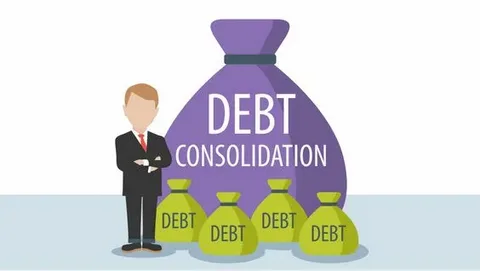Debt can feel like a heavy backpack filled with rocks—each one representing a bill, a loan, or a credit card payment. If you’re feeling overwhelmed by multiple debts, debt consolidation might just be your ticket to a lighter load. In this comprehensive guide, we’ll explore what debt consolidation is, how it works, and why it might be the solution you’re looking for. Let’s dive in!

What is Debt Consolidation?
Debt consolidation is the process of combining multiple debts into a single loan or payment plan. This can simplify your finances and potentially lower your monthly payments. By rolling your debts into one, you can focus on paying off one balance rather than juggling numerous creditors. But before you jump in, let’s break down the different aspects of debt consolidation.
Types of Debt Consolidation
- Personal Loans
- A personal loan can help you pay off credit cards or other debts. You’ll receive a lump sum and then make monthly payments toward the loan.
- Balance Transfer Credit Cards
- These cards allow you to transfer balances from other cards to one card, often at a lower interest rate. Just watch out for fees and the promotional period expiration!
- Home Equity Loans
- If you own a home, you might consider a home equity loan. This type of loan uses your home’s value as collateral. Be cautious, as failing to repay could lead to losing your home.
- Debt Management Plans
- These are typically offered through credit counseling agencies and help you create a structured plan to pay off your debts over time.
Benefits of Debt Consolidation
- Simplified Payments: Instead of multiple payments, you’ll make just one. Think of it as turning your financial chaos into a well-organized filing cabinet.
- Lower Interest Rates: You could save money if you qualify for a lower interest rate. Who doesn’t love saving a few bucks?
- Improved Credit Score: By reducing your debt-to-income ratio, you might see an improvement in your credit score over time.

How Does Debt Consolidation Work?
Debt consolidation usually involves taking out a new loan to pay off existing debts. Here’s a step-by-step breakdown:
- Evaluate Your Debt: List all your debts, including balances, interest rates, and monthly payments.
- Research Consolidation Options: Look into personal loans, balance transfer cards, or other options that suit your financial situation.
- Apply for a Consolidation Loan: Once you’ve chosen an option, apply for the loan. Make sure to read the fine print—no one likes surprise fees!
- Pay Off Existing Debts: Use the funds from your new loan to pay off your old debts. Congratulations! You’ve officially consolidated your debt.
- Make Regular Payments: Stick to your new payment plan. It’s like going to the gym—you might not always want to, but it’s necessary for your financial health!
Is Debt Consolidation Right for You?
While debt consolidation can be a great solution, it’s not for everyone. Consider these factors:
- Debt Amount: If your debts are relatively small, you might manage them without consolidation.
- Interest Rates: If you can’t secure a lower interest rate, consolidation may not be beneficial.
- Financial Discipline: You must be committed to avoiding new debt after consolidation. It’s like going on a diet—you can’t indulge in cake every day!
Common Misconceptions
- “Debt Consolidation is a Quick Fix”
- It’s not a magic wand. You still need to manage your finances wisely.
- “It Will Hurt My Credit”
- In the short term, applying for a loan may cause a slight dip, but over time, it can improve your score if managed well.
- “All Debt Consolidation Options Are the Same”
- Not all methods are created equal. Research is key!
Tips for Successful Debt Consolidation
- Create a Budget: Track your spending and stick to it. Apps like Mint or YNAB can help you manage your finances.
- Emergency Fund: Having a small emergency fund can prevent you from accumulating new debt when unexpected expenses arise.
- Seek Professional Advice: If you’re unsure, consider consulting a financial advisor. They can provide personalized guidance tailored to your situation.

Conclusion
Debt consolidation can be a powerful tool for managing your financial burdens. By understanding the various options, benefits, and strategies, you can take control of your debt and work toward a debt-free future. Remember, it’s not just about consolidating; it’s about changing your financial habits for the long term.
Don’t let debt weigh you down! Take action today, and you’ll be on your way to financial freedom.
For more information, check out these helpful resources: Zekul.net, Cixiq.net, Ucejat.net, Ijofed.net, Jhanak.sbs.
Feel free to reach out if you have any questions or need further assistance!
Leave a Reply